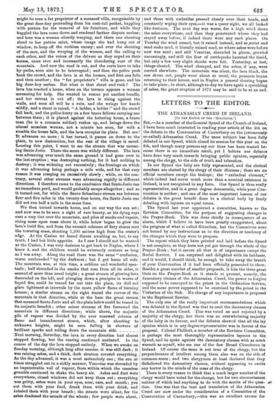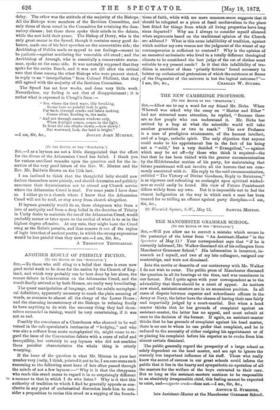LETTERS TO THE EDITOR.
THE ATHANASIAN CREED IN IRELAND.
[TO TEl EDITOR OF TEl "SPECTATOR-1
SIR,—As a member of the General Synod of the Church of Ireland, I have been much interested in reading your article of the 4th on the debate in the Convocation of Canterbury on the (erroneously so-called) Athanasian Creed. The same subject has been fully debated in our Synod, which closed its session for this year on the 8th, and though many persons say our time has been wasted be- cause there is no immediate result, yet I believe our debates have done very much towards bringing public opinion, especially among the clergy, to the side of truth and toleration.
In our Synod the laity are fully represented, and the clerical members are elected by the clergy of their dioceses ; there are no official members except the bishops ; the "cathedral element," which indeed had never much more than a nominal existence in Ireland, is not recognised in any form. Our Synod is thus really representative, and in a great degree democratic, while your Con- vocation is neither ; and one of the most important lessons of our debates is the great benefit done to a clerical body by freely debating with laymen on equal terms.
The Synod last year appointed a committee, known as the Revision Committee, for the purpose of suggesting changes in the Prayer-Book. This was done chiefly in consequence of an alarm, which I believe to have been greatly exaggerated, about the progress of what is called Ritualism, but the Committee were not bound by any instructions as to the direction or tendency of the changes which they were to propose.
The report which they have printed and laid before the Synod is not complete, as they have not yet got through the whole of the Prayer-Book ; but it covers all that is of importance except the Burial Service. I am surprised and delighted with its boldness, and it would, I should think, be enough to take away the breath of your Convocation if it had been officially presented to them. Besides a great number of smaller proposals, it hits the three great blots on the Prayer-Book as it stands at present, namely, the damnatory clauses of the Athanasian Creed, the power to forgive supposed to be conveyed to the priest in the Ordination Service, and the same power supposed to be exercised by the priest in the Visitation of the Sick. No change of any importance is proposed in the Baptismal Service.
The only one of the really important recommendations which was debated in the Synod was that to omit the damnatory clauses of the Athanasian Creed. This was voted on and rejected by a majority of the clergy, but there was an overwhelming majority of the laity in its favour, and the debates showed that all the lay opinion which is in any degree representative was in favour of the proposal. Colonel Ffolliott, a member of the Revision Committee, is perhaps the most thoroughly representative layman in the Synod, and he spoke against the damnatory clauses with as mach warmth as myself, who am one of the few Broad Churchmen ii Ireland. Of course the same is not true of the clergy, but the preponderance of intellect among them also was on the side of common-sense ; and two clergymen at least declared that they disbelieved the damnatory clauses, without appearing to excite any horror in the minds of the mass of the clergy.
There is every reason to think that a much larger number of the clergy would have voted for the change, but for two circumstances neither of which had anything to do with the merits of the quell- 40 tion. One was that the text and translation of the Athanasian Creed are now under the consideration of a Committee of the Convocation of Canterbury,—this was an excellent excuse for
delay. The other was the attitude of the majority of the Bishops. All the Bishops were members of the Revision Committee, and only three of them voted in the Committee for retaining the dam- natory clauses ; but those three spoke their minds in the debate, while the rest held their peace. The Bishop of Derry, who is the only great orator in the Synod, though it contains many good de- baters, made one of his best speeches on the conservative side; the Archbishop of Dublin made an appeal to our feelings—meant to be pathetic—against mutilating the venerable old creed ; and the Archbishop of Armagh, who is essentially a conservative states- man, spoke on the same side. It was naturally supposed that they spoke for the entire Bench, and it was not till after the critical vote that those among the other Bishops who were present stated, in reply to an " interpellation " from Colonel Ffolliott, that they still agreed with the majority of the Revision Committee.
The Synod has sat four weeks, and done very little work. Nevertheless, my feeling is not that of disappointment ; it is rather what is expressed in Clough's lines :—
" See, whore the tired wave, idly breaking,
Seems here no painful inch to gain, Far back, through creeks and inlets making, Comes silent, flooding in, the main. And not through eastern windows only, When daylight comes, comes in the light, In front the sun climbs slowly,—how slowly!
But westward, look, the land is bright."



































 Previous page
Previous page